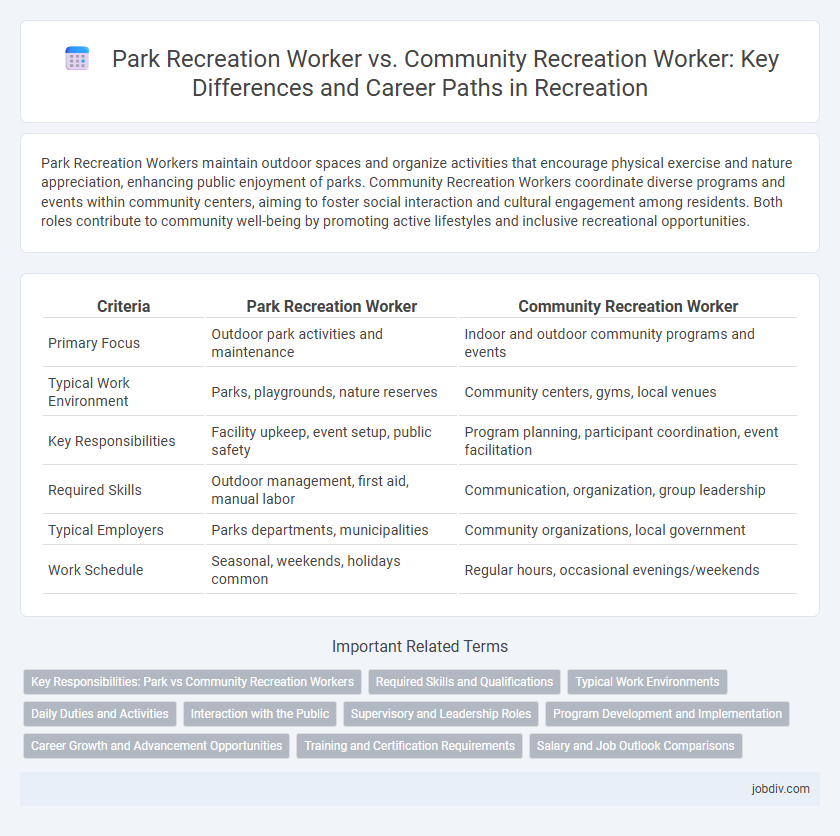Park Recreation Workers maintain outdoor spaces and organize activities that encourage physical exercise and nature appreciation, enhancing public enjoyment of parks. Community Recreation Workers coordinate diverse programs and events within community centers, aiming to foster social interaction and cultural engagement among residents. Both roles contribute to community well-being by promoting active lifestyles and inclusive recreational opportunities.
Table of Comparison
| Criteria | Park Recreation Worker | Community Recreation Worker |
|---|---|---|
| Primary Focus | Outdoor park activities and maintenance | Indoor and outdoor community programs and events |
| Typical Work Environment | Parks, playgrounds, nature reserves | Community centers, gyms, local venues |
| Key Responsibilities | Facility upkeep, event setup, public safety | Program planning, participant coordination, event facilitation |
| Required Skills | Outdoor management, first aid, manual labor | Communication, organization, group leadership |
| Typical Employers | Parks departments, municipalities | Community organizations, local government |
| Work Schedule | Seasonal, weekends, holidays common | Regular hours, occasional evenings/weekends |
Key Responsibilities: Park vs Community Recreation Workers
Park Recreation Workers primarily maintain park facilities, enforce safety regulations, and organize outdoor activities such as sports leagues and environmental education programs. Community Recreation Workers coordinate group events, lead fitness classes, and facilitate cultural or social activities within community centers to promote social engagement. Both roles emphasize public interaction but differ in settings, with park workers focusing on natural environments and community workers on indoor or urban recreational spaces.
Required Skills and Qualifications
Park Recreation Workers require strong physical stamina, knowledge of outdoor activity planning, and first aid certification to safely manage park programs. Community Recreation Workers need excellent interpersonal communication skills, experience in community engagement, and the ability to design inclusive recreational activities for diverse populations. Both roles typically require a high school diploma, but Community Recreation Workers often benefit from additional training in social services or recreation management.
Typical Work Environments
Park Recreation Workers typically perform their duties in outdoor settings such as public parks, nature reserves, and recreational facilities, facilitating activities like sports leagues and nature programs. Community Recreation Workers usually operate within indoor or mixed environments including community centers, schools, and local government buildings, organizing cultural events, educational workshops, and social programs. Both roles collaborate with local agencies but differ in their work environments based on the focus of recreational services provided.
Daily Duties and Activities
Park Recreation Workers manage outdoor spaces, organizing sports leagues, maintaining trails, and supervising playground activities to promote active lifestyles. Community Recreation Workers coordinate indoor programs such as arts and crafts, fitness classes, and cultural events, fostering social engagement within diverse populations. Both roles require client interaction, safety oversight, and the scheduling of recreational activities tailored to community needs.
Interaction with the Public
Park recreation workers engage directly with visitors to facilitate outdoor activities, ensuring safety and providing information about park amenities. Community recreation workers coordinate programs and events that cater to diverse groups within neighborhoods, fostering social interaction and inclusive participation. Both roles emphasize strong communication skills and responsiveness to public needs, but park workers typically focus on natural settings while community workers manage urban or suburban recreational spaces.
Supervisory and Leadership Roles
Park Recreation Workers primarily oversee activities and programs within park settings, ensuring safety and engagement while managing facility operations. Community Recreation Workers focus on broader community initiatives, facilitating diverse recreational programs and often leading volunteer teams to foster community involvement. Both roles require strong leadership skills, but Community Recreation Workers typically exercise greater supervisory responsibilities over multiple projects and larger groups.
Program Development and Implementation
Park Recreation Workers focus on developing and implementing programs tailored to outdoor and nature-based activities within park settings, emphasizing environmental education and physical fitness. Community Recreation Workers design and execute diverse programs targeting urban populations, including arts, sports, and social events that foster community engagement and inclusivity. Both roles require collaboration with local organizations and continuous assessment to ensure program relevance and effectiveness.
Career Growth and Advancement Opportunities
Park Recreation Workers primarily focus on managing and leading outdoor activities, with career growth often linked to roles such as Park Supervisor or Outdoor Program Coordinator, emphasizing skills in environmental stewardship and event planning. Community Recreation Workers engage more with urban or suburban populations, offering diverse programs that foster social development, leading to advancement opportunities in community center management or recreational therapy coordination. Both career paths reward experience and certifications in recreation management, but Community Recreation Workers may find broader advancement potential in public health and social services sectors.
Training and Certification Requirements
Park Recreation Workers typically require CPR and first aid certification alongside a high school diploma, with some roles benefiting from specialized training in outdoor safety and equipment handling. Community Recreation Workers often need similar certifications but may also pursue degrees or certificates in recreation management, community development, or social work to better address urban recreational programming. Both positions benefit from ongoing professional development to stay current with best practices in youth engagement and activity planning.
Salary and Job Outlook Comparisons
Park Recreation Workers earn a median annual salary of approximately $28,000, while Community Recreation Workers have a slightly higher median income around $31,000 due to broader program responsibilities. The job outlook for Park Recreation Workers is projected to grow by 8% over the next decade, reflecting steady demand for outdoor and facility-based activities. Community Recreation Workers anticipate a faster growth rate of about 10%, driven by expanding community programs and inclusive recreational services.
Park Recreation Worker vs Community Recreation Worker Infographic

 jobdiv.com
jobdiv.com